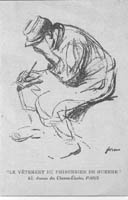Table of Contents
Appendix 8e
Prisoner of War Relief Organization
Requests for Donations
Le Vêtement du Prisonniers de Guerre (Clothing for Prisoners of War)
 This four-page pamphlet is designed to secure donations from the American public to help feed and clothe French and Belgian prisoners of
war in Germany. Secours National (National Relief) was able to provide assistance to civilians in German-occupied territory, but under
its charter, the organization was not able to send aid to war prisoners. As a result, the Paris-based Le Vêtement du Prisonniers de Guerre
strove to fill this gap through the generous support of Americans.1
This four-page pamphlet is designed to secure donations from the American public to help feed and clothe French and Belgian prisoners of
war in Germany. Secours National (National Relief) was able to provide assistance to civilians in German-occupied territory, but under
its charter, the organization was not able to send aid to war prisoners. As a result, the Paris-based Le Vêtement du Prisonniers de Guerre
strove to fill this gap through the generous support of Americans.1
Books! Books! Books!
 As the YMCA readily acknowledged through Association reading rooms, circulating libraries, and work party libraries, war prisoner demand
for books was insatiable. The Board of Education, located in the Victoria and Albert Museum in London, embraced two goals: to obtain books
from the British public for POW's in Germany; and to provide specific books for prisoners to meet their educational needs. The Board of
Education accepted books on any subject or at any level (with the exceptions of magazines, novels, and war literature which would not
readily pass through military censors) and would deliver the contributions to British prisoners free of charge. In addition, the Board
of Education issued a "Form of Record of Study" to allow POW's to earn credit for their wartime studies. The pamphlet urges war prisoners
to "Seize the opportunity to cultivate your mind, improve your knowledge, and, at the same time, alleviate the tedium of your captivity."
Like the YMCA, the Board of Education sought to make incarceration a period of self-improvement.2
As the YMCA readily acknowledged through Association reading rooms, circulating libraries, and work party libraries, war prisoner demand
for books was insatiable. The Board of Education, located in the Victoria and Albert Museum in London, embraced two goals: to obtain books
from the British public for POW's in Germany; and to provide specific books for prisoners to meet their educational needs. The Board of
Education accepted books on any subject or at any level (with the exceptions of magazines, novels, and war literature which would not
readily pass through military censors) and would deliver the contributions to British prisoners free of charge. In addition, the Board
of Education issued a "Form of Record of Study" to allow POW's to earn credit for their wartime studies. The pamphlet urges war prisoners
to "Seize the opportunity to cultivate your mind, improve your knowledge, and, at the same time, alleviate the tedium of your captivity."
Like the YMCA, the Board of Education sought to make incarceration a period of self-improvement.2
Information Respecting the Working of the British Prisoner of War Book Scheme
 This pamphlet described the process by which the British Prisoner of War Book Scheme sent educational and technical books to British
prisoners of war. The organization specially excluded works of fiction and magazines (the latter often ran into problems with German
censors) and focused especially on interned seamen and students incarcerated in prison camps. The organization accepted both cash and
book donations and worked to serve the requests of individual prisoners.3
This pamphlet described the process by which the British Prisoner of War Book Scheme sent educational and technical books to British
prisoners of war. The organization specially excluded works of fiction and magazines (the latter often ran into problems with German
censors) and focused especially on interned seamen and students incarcerated in prison camps. The organization accepted both cash and
book donations and worked to serve the requests of individual prisoners.3
Notes:
Note 1: Le Vêtement du Prisonniers de Guerre. ca. 1916. Armed Services Records Box 55, Folder: "Prisoners of War-Pamphlets in Various Languages-ca. 1914-1918," Kautz Family YMCA Archives, University of Minnesota, Minneapolis, Minnesota. back
Note 2: Board of Education, Books! Books! Books! London, England: circa 1917. Armed Services Records Box 55, Folder: "Prisoners of War-Pamphlets in Various Languages-ca. 1914-1918," Kautz Family YMCA Archives, University of Minnesota, Minneapolis, Minnesota. back
Note 3: Information Respecting the Working of the British Prisoner of War Book Scheme, No Date. Armed Services Records Box 55, Folder: "Prisoners of War-Pamphlets in Various Languages-ca. 1914-1918," Kautz Family YMCA Archives, University of Minnesota, Minneapolis, MN. back